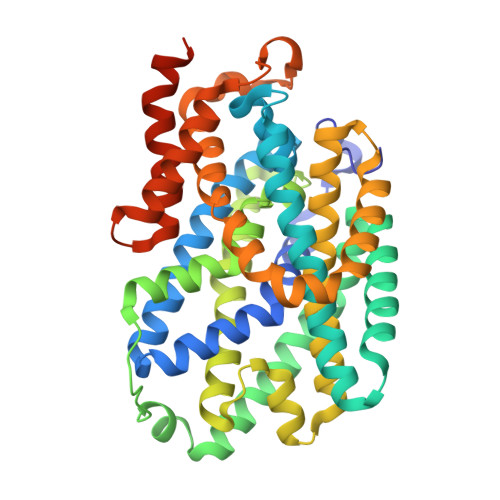Structure of cytosine transport protein CodB provides insight into nucleobase-cation symporter 1 mechanism.
Hatton, C.E., Brotherton, D.H., Spencer, M., Cameron, A.D.(2022) EMBO J 41: e110527-e110527
- PubMed: 35775318
- DOI: https://doi.org/10.15252/embj.2021110527
- Primary Citation of Related Structures:
7QOA - PubMed Abstract:
CodB is a cytosine transporter from the Nucleobase-Cation-Symport-1 (NCS1) transporter family, a member of the widespread LeuT superfamily. Previous experiments with the nosocomial pathogen Pseudomonas aeruginosa have shown CodB as also important for the uptake of 5-fluorocytosine, which has been suggested as a novel drug to combat antimicrobial resistance by suppressing virulence. Here we solve the crystal structure of CodB from Proteus vulgaris, at 2.4 Å resolution in complex with cytosine. We show that CodB carries out the sodium-dependent uptake of cytosine and can bind 5-fluorocytosine. Comparison of the substrate-bound structures of CodB and the hydantoin transporter Mhp1, the only other NCS1 family member for which the structure is known, highlight the importance of the hydrogen bonds that the substrates make with the main chain at the breakpoint in the discontinuous helix, TM6. In contrast to other LeuT superfamily members, neither CodB nor Mhp1 makes specific interactions with residues on TM1. Comparison of the structures provides insight into the intricate mechanisms of how these proteins transport substrates across the plasma membrane.
- School of Life Sciences, University of Warwick, Coventry, UK.
Organizational Affiliation:





















